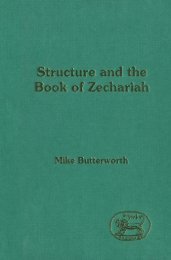Appendix CASE ONE - Collection Point® | The Total Digital Asset ...
Appendix CASE ONE - Collection Point® | The Total Digital Asset ...
Appendix CASE ONE - Collection Point® | The Total Digital Asset ...
Create successful ePaper yourself
Turn your PDF publications into a flip-book with our unique Google optimized e-Paper software.
116 Legal History in the Making<br />
all orders, but at this point the distinction may have prompted caution or<br />
confusion. 27 <strong>The</strong>re may be no way to rank these explanations, but it should be<br />
noted that even the title of the case obscures the role of the Court of Session:<br />
Greenshields v. Provost and Magistrates of Edinburgh.<br />
<strong>The</strong> main point in our context is that the issue seen by modern citators<br />
is very hard to locate in the sources and may be non-existent. Yet the<br />
case had great significance for Anglo-Scottish legal relations, if not in<br />
the way we have been told. We can better appreciate that significance<br />
when we look at the aftermath of the case, when some surprising things<br />
happened.<br />
<strong>The</strong>re was a uniformly negative reaction to the judgement in Scotland. <strong>The</strong><br />
Presbytery of Edinburgh appointed a committee to respond. It drafted a<br />
letter to the Secretary of State to protest at what were called 'judicatories<br />
cloathed with any supream power' and it voiced the fear of 'a design to<br />
restore patronages which would be attended with the greatest disorders in<br />
this church'. 28 On the civil magistrates' side, there were continued arrests<br />
of Episcopal clergy. One pamphlet of 1711 reported at least half a dozen<br />
cases, in Aberdeen, Perth, Crail, St. Andrews and Orkney. 29 <strong>The</strong> author<br />
accused the Lord Advocate (James Stewart) of persecuting them 'with<br />
all the violence in his power' in spite of the Lords' verdict. He further<br />
charged that in November the Lord Advocate ordered the Provost to<br />
close all meeting-houses, which the latter refused to do without a royal<br />
command.<br />
<strong>The</strong> reaction of the Court of Session was much less obvious. <strong>The</strong>re is no<br />
record or report or other acknowledgement of the case after the two entries<br />
in Fountainhall under 1709. <strong>The</strong> other contemporary reporters, Forbes and<br />
Dalrymple, make no mention of Greenshields. Indeed, appeals to the House<br />
of Lords were not well reported at this stage. David Robertson, the leading<br />
student of this early period, wrote that: 30<br />
Questions decided on appeal, after the time of the Union, though they excited<br />
attention, do not seem at first to have been more regarded as precedents, than<br />
the Questions appealed in the Parliament of Scotland had before been.<br />
However important those older appeals had been, under the new regime a<br />
new range of problems appeared. Robertson described the records of early<br />
appeals in the following terms: 31<br />
27 See Maurice Bond, Guide to the Records of Parliament, 114: 'At first Scottish appeals were<br />
received from final decrees only, and it was not until 1726 that H.L. began to hear also appeals<br />
against interlocutory orders'.<br />
28 Minutes of 25 March 1711 (S.R.O., CH 2/121/8, 32).<br />
29 A Letter from a Gentleman in Edinburgh to his Friend in London, giving an Account of the Present<br />
Proceedings against the Episcopal Clergy in Scotland for using the English Lyturgy <strong>The</strong>re (1711).<br />
30 Reports of Cases on Appeal from Scotland, xv.<br />
31 Ibid., xvi-xvii.






